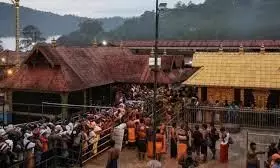
Kerala HC rejects 10-year-old girl’s plea to enter Sabarimala, cites age restrictions
text_fieldsThe Kerala High Court has upheld the existing age restrictions barring women and girls between 10 and 50 years from entering the Sabarimala temple. The ruling came as a disappointment to a 10-year-old girl and her father, who had petitioned the court after her request to visit the revered Hindu shrine was denied.
The case hinged on a series of legal developments surrounding the temple's entry policies. Back in September 2018, a landmark judgment by a five-judge Constitution bench of the Supreme Court had overturned the longstanding ban on women of menstruating age entering Sabarimala. This decision was met with both applause and protests, reflecting deeply held religious sentiments and legal interpretations.
However, in November 2019, another bench of the Supreme Court referred the matter to a larger bench, effectively placing a hold on the implementation of the 2018 verdict. This move was intended to address broader questions about religious practices versus constitutional rights, particularly those outlined in Articles 25 and 26 of the Indian Constitution, which guarantee freedom of religion and the rights of religious denominations, respectively.
The Kerala High Court's recent decision to dismiss the 10-year-old girl's petition underscored the complexity and sensitivity of the issue. Justices Anil K Narendran and Harisankar V Menon explained that until the Supreme Court resolves the pending review petitions and clarifies the legal landscape, the age restrictions based on tradition would remain in place.
Critics of the ruling argue that such restrictions are discriminatory, particularly against young girls who have not yet reached puberty. The girl in question had argued that she should be allowed entry as she had not yet attained puberty, citing customs that she believed supported her case.
The Travancore Devaswom Board, which oversees the administration of Sabarimala, defended the age restrictions as being rooted in longstanding tradition and not in violation of constitutional principles. The board operates over 1,200 temples in Kerala, including Sabarimala, and is under the governance of the state government.
As the legal battle continues to unfold, it remains to be seen how the Supreme Court will reconcile issues of religious freedom, gender equality, and constitutional rights in this highly contentious matter. Until then, the status quo at Sabarimala persists, leaving many stakeholders and observers awaiting further judicial clarity.























